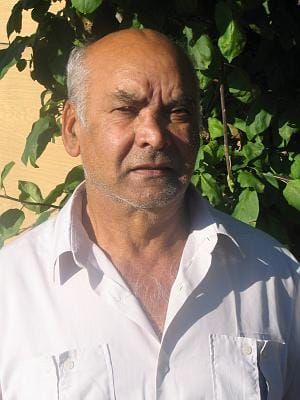We Still Breathe Their Air – Roma writing in the Czech Republic
There have been Roma in Europe since the Middle Ages and today they make up one of the continent’s largest minorities. Roma have a rich and ancient oral culture, that has survived in many forms, despite centuries of discrimination and attempts at forced assimilation. Today, across Europe, traditional Romany ways of life are disappearing under the pressures of modern life, but many are turning to writing as a way of preserving and asserting their culture.

Over the years I’ve been lucky enough to get to know many Roma writers in the Czech Republic, both from the older generation that grew up before the Velvet Revolution and from the two generations that have emerged since.
We Still Breathe Their Air
One project I particularly enjoyed working on was a documentary I made in 2005 together with the British journalist and broadcaster Simon Evans, a coproduction between Radio Prague and BBC Radio 3. We were interested in comparing Roma writing in the Czech Republic and Britain, and we spoke to writers, poets and musicians in both countries.
Here is that programme, We Still Breathe Their Air (the title comes from an English Romany song), narrated by Simon Evans.
The programme features the Czech Roma musician Gipsy (Radek Banga), writers Ilona Ferková and Andrej Giňa, the writer and poet Tera Fabiánová and Tera’s son, musician and songwriter Vojta Fabián. We also hear from Milena Hübschmannová, who was untiring in her work to promote Czech and Slovak Roma writing. On the British side, we talked to Hester Hedges, Bill Lee, David Morley and Brian Belton. Simon Evans is the author of Stopping Places, a brilliant book about Romany life in south-east England. Sadly, he died in 2014.
Roma writing
Andrej Giňa (1936-2015) lived in the West Bohemian town of Rokycany, but his roots were in the Romany settlements of Eastern Slovakia. He was a brilliant storyteller and one of the pioneers of modern Romany writing in Czechoslovakia and the Czech Republic. He wrote in the Romany language. Here is a programme I made with Andrej.
On the poetry and poverty of the settlements
Ilona Ferková (born 1956). Like Andrej Giňa, Ilona lives in the West Bohemian town of Rokycany, where she was born. She too is a brilliant storyteller. Her stories, written in Romany, give us many insights into Romany life in today’s Czech Republic. Here is a programme with and about Ilona and her work.
Ilona Ferková and her stories that capture Roma life in the Czech Republic today
In 1999 Ilona Ferková and her husband applied for asylum in the United Kingdom. They spent four years in the Kentish seaside town of Margate, before eventually giving up their application and returning to the Czech Republic. I commissioned Ilona to write an account of some of her experiences of that time. It was published in the anthology Čalo vod’i in 2008 in the original Romany and Czech translation as Vakeriben pal e Anglija – Příběhy z Anglie.
Here is my English translation Stories from England, working from the Czech translation by Helena Sadílková.
Tera Fabiánová (1930-2007). If anybody can be described as a born poet, then Tera Fabiánová must be a strong candidate. Although she left school at just eleven, she was fluent in four languages, and her poetry and her stories are unmatched in the way they take the rhythms of the spoken word and draw out their lyrical potential – whether in Czech, Hungarian or her native tongue: Tera was a Romany, and much of her work was written in the Romany language, spoken in various dialects by Europe’s Roma communities for many centuries. It was always a joy visiting Tera, whose love for poetry and song was infectious.
Tera Fabiánová – a poetic pioneer
Irena Eliášová (born 1953). The poet, playwright and novelist Irena Eliášová spent her early childhood in a Romany village in south-western Slovakia. The memory of this time has become the defining experience in her writing. But Irena does not write just about the lost world of her childhood in the 1950s and 60s. She has also written powerfully and poignantly about the life of Roma in the Czech Republic today.
Irena Eliášová – a song to raise your spirits
Milena Hübschmannová (1933-2005). Milena studied Hindi, Urdu and Bengali in Prague, and in the early 1950s became increasingly interested in the Romany language, which also has its roots in India. To learn the language she lived among Romany families, and made many Romany friends. She had great difficulties with the regime in the 1970s as she strongly opposed official attempts to force Roma to assimilate. Milena played a huge role in reviving and recording the Romany language in Czechoslovakia and was the author of the first Czech-Romany dictionary. She also encouraged her Roma friends to write. Milena was a person of extraordinary charisma.
In 2003 I visited Milena together with Bernie Higgins.
https://english.radio.cz/neglected-wealth-roma-writing-czech-republic-8078842
Here is a second programme I made shortly after Milena’s death in 2005.
A champion of Romany language and culture dies
Roma and the social media
Over the last fifteen years many Roma have embraced the social media, and this has helped to keep the Romany language alive and to keep the Romany diaspora connected. I spoke to the writer, journalist and photographer, Lukáš Houdek, about this phenomenon. Lukáš was the driving force behind the creation of KHER.CZ, a website that has been publishing Romany writing since 2012.
Romany writers at home on the social media